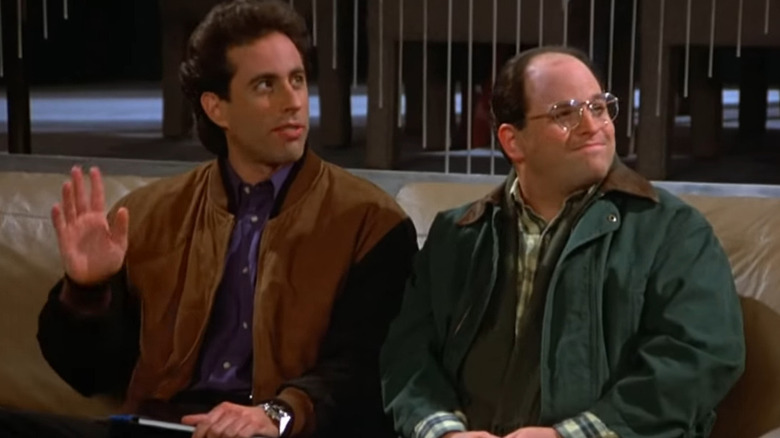The Two Dark Rules Larry David Had On The Set Of Seinfeld
"Seinfeld" was famously the show about nothing. The central characters would get into all kinds of awkward predicaments, which is par for the course for sitcoms. However, in most other programming, the characters learn some sort of lesson about morality and/or ethics. They grow into better people by the end of the episode, even if they completely forget said lesson by the next one.
Other sitcoms would be about learning to be a better friend in the workplace or offering some level of social or political commentary. But not "Seinfeld." The characters would be precisely the same by the ending, and that's why it continues to be beloved to this day. The focus was on mining the humor out of given situations rather than making a statement about humanity. As such, the only thing expected out of the audience is to laugh their butts off, so it perhaps should come as no surprise to hear what the two prominent rules of the series were.
No hugging, no learning
The show's co-creator, Larry David, had two simple rules for making "Seinfeld" episodes, namely "No hugging" and "No learning." It's an ethos you can see in every installment, as there aren't any sentimental moments where the friends come together to hug one another after a misunderstanding. They also never learn their lessons, often going through a comedy of errors to wind up being the same exact people by the episode's end.
In fact, David elaborated on this idea, once telling an interviewer, "A lot of people don't understand that 'Seinfeld' is a dark show. If you examine the premises, terrible things happen to people. They lose jobs; somebody breaks up with a stroke victim; somebody's told they need a nose job. That's my sensibility" (via The Atlantic). At their core, the four friends are awful people, as exhibited in Season 5's "The Hamptons" when Jerry (Jerry Seinfeld) and Elaine (Julia Louis-Dreyfus) meet a friend's new baby. They then proceed to call it "the ugliest baby" either one has ever seen.
To take things a step further, you can also look at the insanely dark "The Checks," which is kind of impressive to watch in this day and age just for how it could possibly get made. In the episode, Jerry hits Elaine's boyfriend in the head with an axe. Her boyfriend dies during the subsequent surgery due to the surgeon getting distracted. It's an extreme circumstance for any set of characters to go through, but amazingly, no one learns a lesson through all this. After all, what's there to learn? That you shouldn't hit people in the head with axes? It's all just a bunch of stuff that happens with no one becoming a better person by the story's end.
They don't learn lessons; they're just bad people who get into hilarious situations, and it's gone on to become one of the most popular TV shows of its era.
Seinfeld was darker than you might remember
"Seinfeld" may have been a sitcom, but it wasn't afraid to delve into genuinely dark territory to find jokes. This is entirely within Larry David's ethos that the show should not have any lessons learned whatsoever, and nowhere is this more evident than in the episode "The Invitations," where George's (Jason Alexander) fiancée, Susan (Heidi Swedberg), dies.
Death isn't entirely out of the question for a funny show, but usually, it's part of a "very special" storyline where things get serious for those proceedings. But then again, "Seinfeld" isn't like most shows, and when Susan died by licking a poisoned envelope, it was done in a classic "Seinfeld"-esque way. And the reason she was killed off sounds like it could've come out of a "Seinfeld" episode itself, with the cast later mentioning how none of them really connected with the actress' comedic sensibilities.
As Jason Alexander once told Howard Stern, "Her instincts for doing a scene — where the comedy was — and mine were always misfiring. And she would do something, and I would go, 'OK, I see what she's going to do, I'm going to adjust to her,' and then I'd adjust, and she'd change" (via New York Post). Even the series finale was pretty bleak. It involves the main four characters getting locked up in prison after seeing a man getting robbed and instead of helping, they merely watch and laugh.
It's a perfect encapsulation of the series itself. The characters were truly awful people who just so happened to be funny, and it inspired a whole subgenre within sitcoms of terrible people being hilarious like "It's Always Sunny in Philadelphia" and "You're the Worst." "Seinfeld" truly changed the landscape of sitcoms and what people could do within the confines of the genre.


